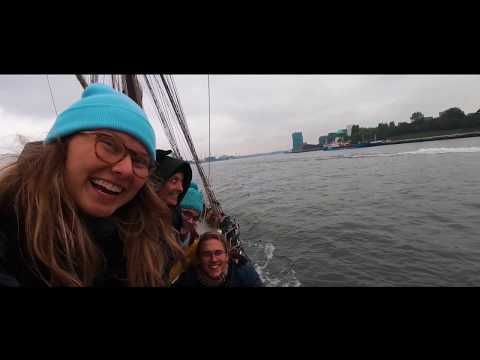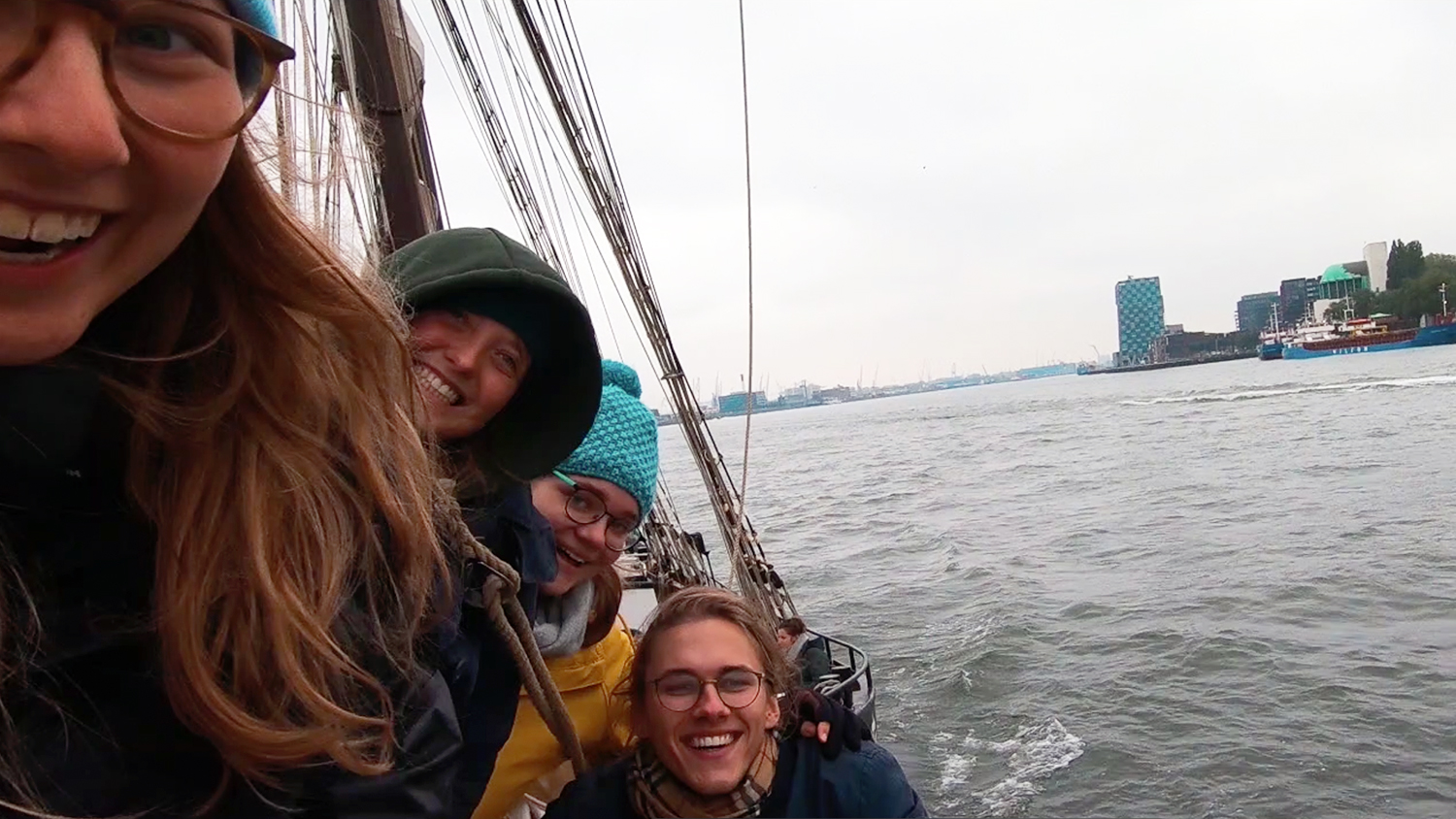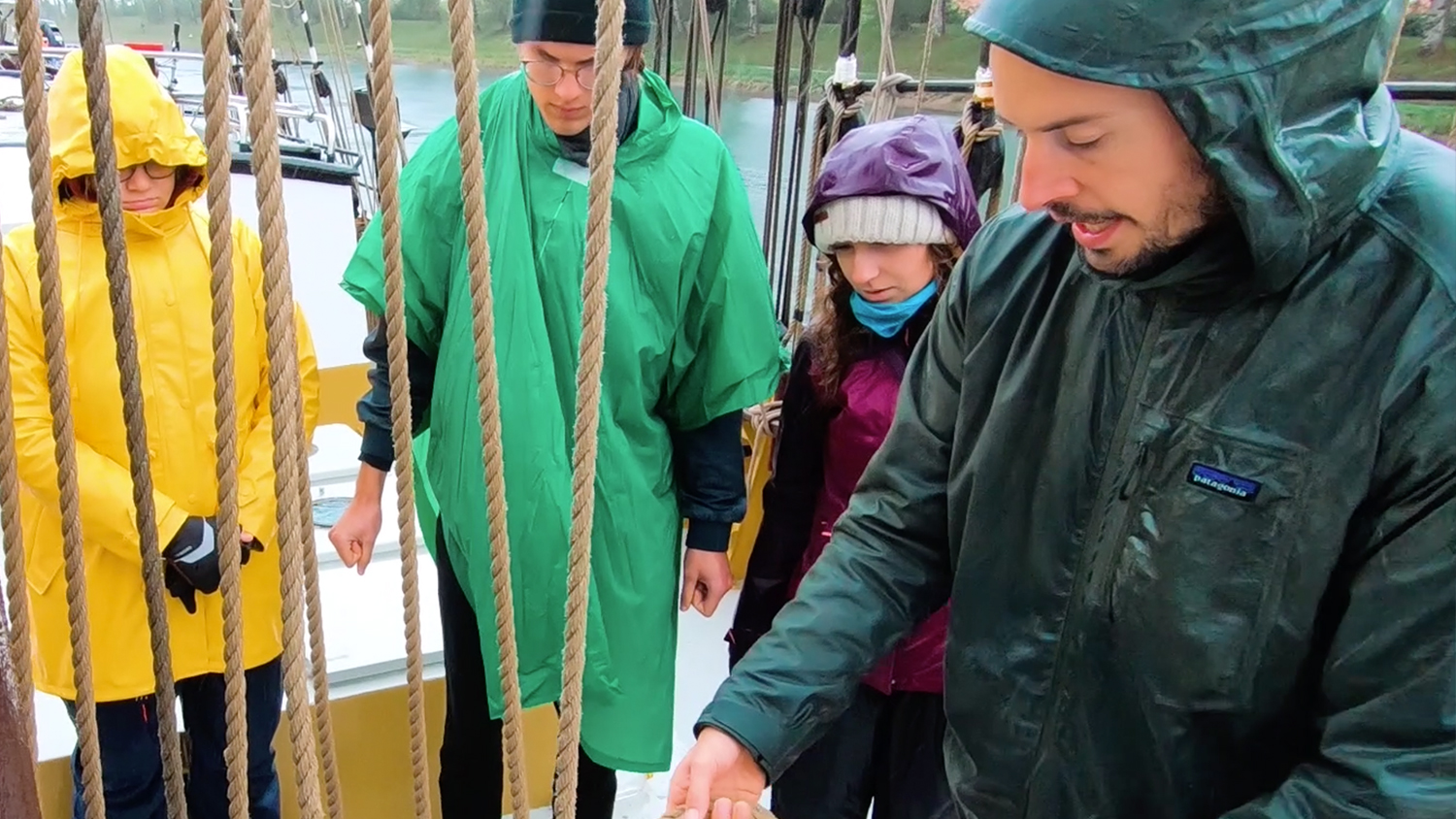Pilot: Class on a sailboat on route between Antwerp and Rotterdam

“Sitting close to each other day and night with eleven people – seven students and four supervisors – that seemed like a challenge to me. You’re constantly working with other people, so you automatically share what you’re doing,” says Remco Straathof. He’s a student of Sustainable Development, and is on the board for Enactus, the association that encourages social entrepreneurship.
He heard about this special educational project, and decided to sign up. Early October, he embarked on the schooner ship Jantje, which had been docked in Antwerp. The person behind this initiative is Peter Linde, founder of the Social Enterprise Lab and teacher of Social Entrepreneurship at the Faculty of Law. He also founded the Learning Lab in Overvecht, in which he and his students worked on social innovations in the neighbourhood. That project received the Law faculty’s Impact Award 2019.
Combining sailing and education
Linde is an enthusiastic sailor, and last spring joined a project to Spitsbergen, which encouraged his idea of taking students with him on a boat. “It’s my dream to equip an entire expedition ship one day, to travel with my students to a location somewhere in this world where their contribution can make a difference. My idea is that this type of education, on a boat, can be a great addition to the existing curriculum. You’re working really intensively in a group to get work done on the boat. At the same time, you’re invited to think about the impact you wish to have in the future.”

The journey in September was a trial run, to combine sailing and education. A schooner ship was chartered for a few days, and a call was issued for students to sign up. The theme of the boat trip was sustainable entrepreneurship. The students had a number of meetings with entrepreneurs, but also received a challenge: to pick up a plan of their own and develop it. Preferably in the area of social and sustainable entrepreneurship. Linde: “During the trip, they had the change to work on their projects by themselves, but also to discuss their plans with the other people on board. Because you’re working together, and you’re constantly on the move, the conversations are more intensive. One student told me he was struggling with a question when someone yelled ‘all hands on deck!’ and after hoisting the sails, he had an answer to his question.”
The educational sailing project was realised in collaboration with the organisation Nature Quest, which was founded by UU alumni, and with a grant from the innovation foundation of the World Wide Fund for Nature (WWF). For them, an important part of the project was learning in nature about the theme of sustainable entrepreneurship. The grant meant that students only had to pay 100 euros for the journey and food. The students did not receive any ECTS for this programme.
The students had to work on their own projects, preferably one about sustainability. But there were also students who wanted to find out which Master’s programme would be the best fit for them after their Bachelor’s. Aside from contemplating study programmes, the students also met with social entrepreneur Thomas Goorden of the creative agency Een wereld met lef, an agency that runs projects in the area of sustainability and inclusivity, and with Dockwize, an incubator in Vlissingen that offers programmes to students, innovators and smaller start-ups to help them develop their ideas into companies.
Rebecca Hanke, student of Global Sustainability Science, was another participant of the sailing trip. “For me, it was good to reflect on my studies so far, back to the roots. With this experience, I wanted to regain ownership of my own education. I did my Bachelor’s, but had sort of lost track of what I wanted to do with it in the future. I wanted to get a clearer idea of that. It took some getting used to, with all those new people on a boat together. But when you get to know people and you talk to them about what makes them tick, that is so inspirational to me.”

Next trip to Aruba
The students want to promote this type of education. They made podcasts and an after movie (see below the article). “It clearly goes beyond just a reflection on your studies,” Linde says. “We encourage the impact you can have as a student, especially in the area of social and sustainable entrepreneurship. After the journey, the students get together a number of times. They continue to develop the ideas they came up with during the trip, and talk about those ideas with each other. There were students, for example, who worked on starting an organisation in biofuel made from seaweed, and another worked on sustainable soap.”
In early 2020, there will be a reflection to see whether this educational concept will have a sequel. They will check the project’s feasibility, including its finances. Linde is already working on a possible follow-up to the project. “In the future, I’d want to see whether we can focus the education more on sustainable graduation projects for the Master’s Organisational Change and Management. The students currently graduate by conducting research and writing an academic thesis. We want to see if we can turn that into more applied graduation projects. One option is travelling to Aruba, where the residents of several islands in the area have numerous issues that the students, along with local stakeholders, could work on finding solutions to, using the ship as a means to connect people and places. You can view the ship as an incubator for learning how to ask better questions, by meeting others and exchanging ideas.”
The plans aren’t finalised yet, but the dreams already exist. Then, too, Linde would want to keep the cost for students low, by using subsidies or contributions from the projects’ clients. “My experience, and this pilot once again shows that, is that a ship, in combination with activities on land, provides an ideal, adventurous learning environment. I’d love to see a future where more use is made of that.”